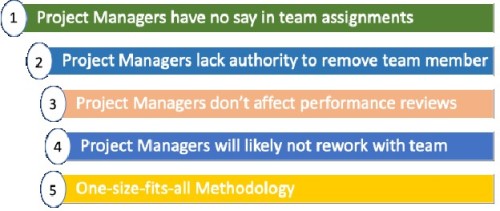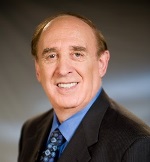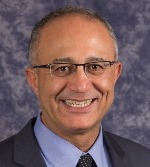ADVISORY ARTICLE
By Harold Kerzner, Ph.D. and Al Zeitoun, Ph.D.
Florida and Maryland, USA
LEADERSHIP: THE EARLY YEARS ________________________________________
For almost 60 years, perhaps the biggest challenge facing organizations was deciding what leadership style would be best for project management practices. In the early years of project management, leadership was defined almost always in terms of the project manager’s authority and power. Most project managers had technical backgrounds, and the authority they used was centered around the technical decisions that had to be made. The project charter usually identified the authority given to the project managers and the types of decisions they were allowed to make. Senior management prepared the charters and wanted to be sure that the project managers did not have the authority to make any decisions that were supposedly reserved for senior management or project sponsors.
The second component of the project manager’s leadership style was the use of power. Power was often described as the ability to influence members of the workforce. Most project management textbooks identified five commonly used types of power:[1]
-
- Legitimate power. The ability to gain support because project personnel perceive the project manager as being officially empowered to issue orders.
- Reward power. The ability to gain support because project personnel perceive the project manager as capable of directly or indirectly dispensing valued organizational rewards (i.e., salary, promotion, bonus, future work assignments).
- Penalty power. The ability to gain support because the project personnel perceive the project manager as capable of directly or indirectly dispensing penalties that they wish to avoid; usually derives from the same source as reward power, with one being a necessary condition for the other.
- Expert power. The ability to gain support because personnel perceive the project manager as possessing special knowledge or expertise (that functional personnel consider as important).
- Referent power. The ability to gain support because project personnel feel personally attracted to the project manager or his project.
Although organizations had good intentions in defining leadership in terms of authority and power, as seen in Figure 1, there were several obstacles that impeded successful project management leadership practices. First, project managers had virtually no say as to which functional employees would be assigned to their projects. Functional managers made the majority of the decisions. Second, project managers did not possess the authority to remove non-performing functional employees from their projects without permission of the functional managers.

Figure 1 – Project Management Leadership Obstacles
Third, and perhaps the most serious roadblock, was that most project managers often had no input into the performance reviews of the team members. Fourth, most of the projects were short-term, and the project manager might never work with these people again. Fifth, most companies used a one-size-fits-all methodology for all projects and leadership was believed to have the right to “force” compliance and use of the tools in the methodology. These five obstacles significantly impeded the project manager’s leadership ability.
More…
To read entire article, click here
How to cite this article: Kerzner, H., Zeitoun, A. (2025). The Growth of Proactive Project Management Leadership, PM World Journal, Vol. XIV, Issue XI, November. Available online at https://pmworldlibrary.net/wp-content/uploads/2025/10/pmwj158-Nov2025-Kerzner-Zeitoun-Proactive-project-management-Leadership.pdf
About the Authors

Harold Kerzner, Ph.D., MS, M.B.A
Senior Executive Director for Project Management
International Institute of Learning
New York & Florida, USA
![]()
Dr. Harold Kerzner is Senior Executive Director for Project Management for the International Institute for Learning (IIL). He has an MS and Ph.D. in Aeronautical and Astronautical Engineering from the University of Illinois and an MBA from Utah State University. He is a prior Air Force Officer and spent several years at Morton-Thiokol in project management. He taught engineering at the University of Illinois and business administration at Utah State University, and for 38 years taught project management at Baldwin-Wallace University. He has published or presented numerous engineering and business papers and has had published more than 60 college textbooks/workbooks on project management, including later editions. Some of his books are (1) Project Management: A Systems Approach to Planning, Scheduling and Controlling; (2) Project Management Metrics, KPIs and Dashboards, (3) Project Management Case Studies, (4) Project Management Best Practices: Achieving Global Excellence, (5) PM 2.0: The Future of Project Management, (6) Using the Project Management Maturity Model, and (7) Innovation Project Management.
He is a charter member of the Northeast Ohio PMI Chapter.
Dr. Kerzner has traveled around the world conducting project management lectures for PMI Chapters and companies in Japan, China, Russia, Brazil, Singapore, Korea, South Africa, Canada, Ireland, Germany, Spain, Belgium, Poland, Croatia, Mexico, Trinidad, Barbados, The Netherlands, Sweden, Finland, Venezuela, Columbia, United Arab Emirates, France, Italy, England, and Switzerland. He delivered a keynote speech at a PMI Global Congress on the future of project management.
His recognitions include:
-
- The University of Illinois granted Dr. Kerzner a Distinguished Recent Alumni Award in 1981 for his contributions to the field of project management.
-
- Utah State University provided Dr. Kerzner with the 1998 Distinguished Service Award for his contributions to the field of project management.
-
- The Northeast Ohio Chapter of the Project Management Institute gives out the Kerzner Award once a year to one project manager in Northeast Ohio that has demonstrated excellence in project management. They also give out a second Kerzner Award for project of the year in Northeast Ohio.
-
- The Project Management Institute (National Organization) in cooperation with IIL has initiated the Kerzner International Project Manager of the Year Award given to one project manager yearly anywhere in the world that demonstrated excellence in project management.
-
- The Project Management Institute also gives out four scholarships each year in Dr. Kerzner’s name for graduate studies in project management.
-
- Baldwin-Wallace University has instituted the Kerzner Distinguished Lecturer Series in project management.
-
- The Italian Institute of Project Management presented Dr. Kerzner with the 2019 International ISIPM Award for his contributions to the field of project management.
Dr. Harold Kerzner can be contacted at hkerzner@hotmail.com

Dr. Al Zeitoun, PgMP, PMI Fellow
Strategy Advisor & Global Future of Work Executive
Maryland USA
![]()
Dr. Al Zeitoun is a Future of Work, business optimization, and operational performance excellence thought leader with global experiences in strategy execution. His experiences encompass leading organizations; delivering their Enterprise Digital and Business Transformation; guiding fitting frameworks implementations; and using his empathy, engineering insights, and collaboration strengths to successfully envision new business models and execute complex missions across diverse cultures globally.
In his recent role with Siemens, he was a Senior Director of Strategy responsible for driving the global program management practices, Master Plan governance, and enabling the Strategy Transformation processes and priorities.
In his position, as the Executive Director for Emirates Nuclear Energy Corporation, Abu Dhabi, UAE, he was responsible for creating the strategy execution framework, achieving transformation benefits, governance excellence, and creating the data analytics discipline necessary for delivering on the $40B complex country energy mission roadmap.
At the McLean, USA HQ of Booz Allen Hamilton, Dr. Zeitoun strategically envisioned and customized digitally enabled EPMO advisory, mapped playbooks, and capability development for clients’ Billions of Dollars strategic initiatives. Furthermore, he led the firm’s Middle East North Africa Portfolio Management and Agile Governance Solutions.
With the International Institute of Learning, Dr. Zeitoun played a senior leader and global trainer and coach. He was instrumental in driving its global expansions, thought leadership, and operational excellence methodology to sense and shape dynamic ways of working across organizations worldwide. He speaks English, Arabic, and German and enjoys good food, travel, and volunteering. Dr. Al Zeitoun can be contacted at zeitounstrategy@gmail.com
[1] Kerzner, H., (2025), Project Management: A Systems Approach to Planning, Scheduling and Controlling, John Wiley & Sons Publishers, P.250-251.









